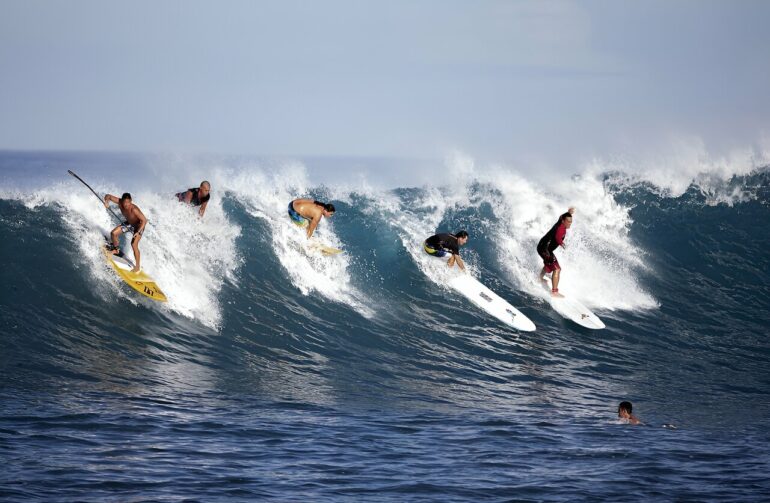Last year, the International Olympic Committee announced that the South Pacific island of Tahiti will host the two-day surfing competition for the 2024 Paris Summer Games. The site in question, Teahupo’o, is revered among surfers for the legendary speed and ferocity of its waves; it is equally venerated by locals for the abundant food it provides, the pristine clarity of the lagoon where families swim and its vibrant reefs.
Now, the committee plans to install a 1,615 square-foot aluminum judging tower in the middle of this iconic reef. The structure will include more than 130 drill holes into the reef in order to lay a concrete foundation. The tower’s permanency, and the construction required, is liable to irrevocably damage the reef. It will also likely devastate the local marine ecosystem.
Biological oceanographer Ajit Subramaniam, who works at Columbia Climate School’s Lamont-Doherty Earth Observatory, voices concerns about the feasibility of any mitigation measures. Coral grows at about an average rate of one centimeter per year, he says, which means “planting new corals might take a while to build up to replace or make up for damages to the reef due to construction.” He questions why damage must be done to such a fragile ecosystem, especially when visitors to the Olympics are likely coming to Tahiti for its natural beauty as much as they are for the surfing competition.
Carly Kenkel, who is an assistant professor of biological science in marine and environmental biology at the University of Southern California, believes that the scale of the tower will require removing some coral from the site. Reefs are not 100% coral though; data shows that around 24% of Tahiti’s reef is coral cover. Coupled with the fact that average water temperatures in the area are 1–2°C higher than normal, any relocation projects must take special care to ensure the safety of what coral there is.
Plans to relocate some of the coral are reportedly underway, but with only six months until the opening ceremony, safely relocating more than 1,000 live corals (representing 24 distinct species) from the site is a daunting task. One estimate asserts that $1.3 million of ecosystem damage could ensue from the construction and implementation of the tower. In December, video footage surfaced of a construction barge tearing up the shallow reef with its propeller as it attempted to chart a safe path through the lagoon.
“In this day and age, we cannot afford to lose coral by accident. This year is predicted to be a major bleaching year, so anything that imposes additional stress on the reef should be avoided, especially this year,” says Kenkel.
Paris 2024 claims to emphasize sustainability, and their website cites a commitment to halving their emissions. They also say they will use existing or temporary venues for 95% of their events and that unavoidable emissions will be offset.
Beijing 2022 touted similarly lofty sustainability claims with its goal of 100% carbon-neutrality. Yet the massive amounts of artificial snow required for those Games utilized millions of gallons of water and potentially hazardous chemicals. Thousands of trees were uprooted to construct the ski center.
Cycle after cycle, the Olympics have claimed to be environmentally responsible, but have actually become less sustainable over time. The reasons for that are myriad, but two stand out as particularly notable.
First, there is the sheer scale of the event. Spectators, officials and athletes are flying in from all around the world. Despite the Games’ laudable commitment to 100% clean energy, the energy grid might prove deficient in some capacity. Some nations have not ruled out the possibility of flouting the 100% clean commitment in an effort to keep their athletes primed physically, should renewable energy prove insufficient in keeping them cool during the hottest time of the year.
The other problem is the Olympics’ focus on carbon reduction. Carbon reduction is important, but relying on offsets as a tool is problematic as they are notoriously difficult to track and quantify. And even if all the carbon emitted during the Games were truly offset, what about other ecological concerns? The outcry over the Tahitian tower is rooted not in carbon, but in ecology and tradition.
Preserving our environment begins with not harming it in the first place. There are too many instances of nations with historically low emissions records bearing the brunt of what industrialized economies like France have wrought. A permanent installation for a two-day event is excessive for a Games committing itself to having a very small environmental impact.
The goals espoused by Paris 2024 are laudable. But they threaten to be undone if such a heavy mark is left on a pristine locale. Because in the end, long after the Games are over, it is the people who live around the lagoon who will have to look out day after day at that tower and be reminded of how their world has changed.
Provided by
Earth Institute at Columbia University
This story is republished courtesy of Earth Institute, Columbia University http://blogs.ei.columbia.edu.
Citation:
Opinion: Why hosting an Olympics competition in Tahiti is a really bad idea (2024, March 5)



